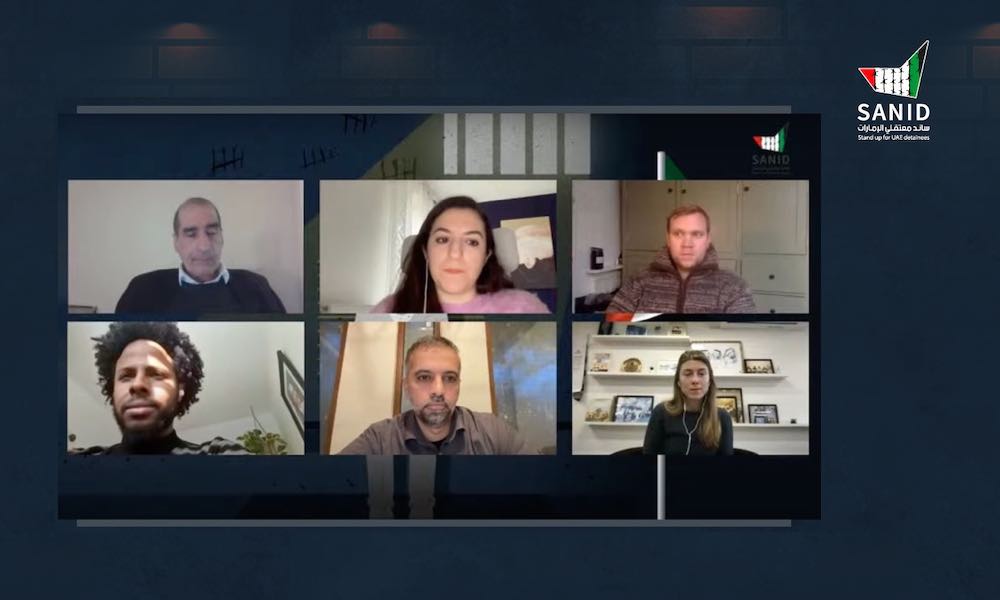SANID Campaign, Stand up for UAE detainee, held on Tuesday evening an online webinar introducing the campaign’s goals and work.
Moderated by Aziz Mahmoud, research officer at the International Campaign for Freedom in the Emirates (ICFUAE), the webinar included the executive director of the Emirates Detainees Advocacy Center (EDAC) Hamad Al Shamsi, Emirati human rights defender Jenan Almarzooqi, director of the Gulf Center for Human Rights (GC4HR) Khalid Ibrahim, director of MENA Center for Human Rights Enas Osman, the British academic Matthew Hedges, and the director of ALQST organisation Julia Legner.
Al Shamsi shed light on the plight of political detainees in the UAE jails, saying that 60 Emirati key figures have been detained in UAE jails for more than ten years, including academics and activists.
More than three quarters of those detainees have completed their prison sentences but are still in arbitrary detention, Al Shamsi pointed out.
He added that the UAE authorities continued to arbitrarily detaining human rights defenders and political activists such as Ahmed Mansour and Dr. Nasser bin Ghaith, calling on the international community to press for their immediate release.
Al Shamsi said that the Emirati female prisoner Alia Abdel Nour died in prison after being denied medical treatment, saying that the UAE authorities are ready to keep prisoners in prison till their death.
The time has come to achieve justice for those prisoners, Al Shamsi added, calling on Emirati authorities to respect the prisoners’ rights and release them.
The Emirati woman human rights defender, Janan Al-Marzouqi, shed light on the violations and harassment that families of the detainees are subjected to.
The families of the detainees are subjected to systematic reprisals including discrimination, restrictions on their study, work, and medical treatment, in addition to citizenship revocation and travel ban.
The daughter of Emirati prisoner of conscience Abdulsalam Darwish pointed out that the UAE authorities revoked the citizenship of 19 members of the detainees’ families and denied the identity documents to 22 others, and prevented the travel of more than 30 others.
She further pointed out that the UAE authorities also revoked the citizenship of all her family members.
For his part, the director of GC4HR, Khalid Ibrahim, highlighted the violations that Emirati prisoners of conscience are subjected to in the UAE secret prisons and counselling centres.
56 prisoners of conscience are currently held in UAE prisons after completing their sentences, but the UAE authorities refuse to release them, he said.
According to the Emirati law, any prisoner who spends more than three-quarters of his prison sentence can be released before his release date. However, this is not applied to the Emirati political prisoners, Ibrahim said.
Ibrahim pointed out that the so-called Counselling Centres do not provide any support for detainees, saying that it is only used as a pretext to keep the prisoners behind bars. He urged human rights organisations to make all possible efforts to pressure for their release.
In her turn, Enas Osman, director of MENA, shed light on the human rights violations practiced by the UAE State Security Apparatus. The UAE State Security Law grants the State Security Apparatus all powers to prevent any political activism in the country, she said.
Taking advantage of the UAE repressive laws such as the ‘Anti-Terrorism’ Law and the ‘Counsel Law’, the State Security Apparatus is practicing unlimited repression, Osman said, describing these legislations as among the most repressive laws in the MENA region.
On the other hand, the British academic Matthew Hedges emphasised the importance of the SANID Campaign, stressing that silence is not an option.
Director of ALQST, Julia Legner, also stressed the need for an international intervention to stop human rights violations in the UAE.
Although the European Parliament and some international bodies have already issued resolutions on this case, the international community must activate these decisions and hold the UAE authorities accountable for these violations, she concluded.


